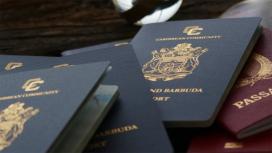Blog • Published on:March 7, 2025 | Updated on:March 7, 2025 • 18 Min
The Strongest Passports in the World: Global Ranking in 2025
A passport is one of the most important possessions for each individual. Without it, you lose your identity and can hardly move around your own country, let alone to another country. A passport, in essence, is what allows you to move freely around the world. Like many things, not all passports are valued the same—the freedom to travel is different depending on where you are from.
In today's world, the power of a passport extends beyond mere identification, it's a key to global mobility, economic opportunities, and an enhanced quality of life. The strength of a passport determines the ease with which its holders can traverse international borders, engage in business ventures abroad, and explore diverse cultures without the hindrance of visa restrictions.
Some passports, like the Japanese passport, allow you to travel to over 190 countries visa-free or with minor pre-travel documentation. When you happen to hold a passport from Nepal, that number drops down to 40 countries. Let’s take a look at the world's strongest passports and what factors contribute to their rankings.
Top 20 Most Powerful Passports in the World
A passport is a reflection of a country’s diplomatic reach and international reputation. The stronger a passport, the more seamless global travel becomes for its holders. The difference between a top-tier passport and a weaker one isn’t just about convenience; it affects everything from business opportunities to personal freedoms and even emergency relocation.
While some passports offer unrestricted access to almost 200 destinations worldwide, others are met with complex visa application processes, long waiting periods, and potential travel bans.
Let’s take a closer look at the 2025 rankings.
Asia’s Passport Powerhouses
Asian nations continue to dominate the rankings, proving that strategic diplomacy and strong economies directly contribute to passport strength. The leading passports in the region, Singapore, Japan, and South Korea, grant near-universal travel freedom.
Singapore: One of the Most Powerful Passports in 2025
Singapore has secured one of the top spots this year, offering its citizens visa-free or visa-on-arrival access to 1182 destinations. This makes it the most travel-friendly passport in the world.
Singapore’s dominance in the passport rankings is no accident. Over the past decade, the country has secured numerous visa agreements, expanding its reach beyond traditional markets in Asia and Europe to include parts of Africa and South America.
Why Is Singapore’s Passport So Strong?
- Strategic diplomacy: Singapore has actively pursued visa agreements with key nations, particularly in emerging markets.
- Global trust: Due to low crime rates and strict immigration policies, Singaporeans are seen as low-risk travelers by many governments.
- Economic partnerships: The country’s financial influence means that many governments prioritize ease of travel for Singaporean investors and businesspeople.
Japan: A Consistent Leader in Passport Strength
Japan follows closely behind Singapore, offering visa-free access to 181 destinations. Japan previously held the top spot for several years but was overtaken by Singapore due to the latter’s broader diplomatic outreach.
Japan’s passport strength is a direct result of its long-standing diplomatic relationships, particularly with European and North American nations.
Key Strengths of the Japanese Passport:
- Strong visa agreements with EU nations, the U.S., and Canada.
- A low overstay rate, ensuring that Japanese travelers are welcomed worldwide.
- Japan’s economic stability and role as a global tech and trade hub make it a valuable international partner.
South Korea: Matching Japan in Global Mobility
South Korea ties with Japan at 180 visa-free destinations, making it one of the most desirable passports in the world. The country’s rise in passport rankings has been steady over the years, thanks to improved diplomatic ties and a stronger global presence.
South Korea benefits from:
- A powerful economy that facilitates better trade and travel agreements.
- Close diplomatic relations with both Western nations and its Asian neighbors.
- A strong reputation for security and stability, making South Korean travelers welcome almost everywhere.
European Passports: Unmatched Mobility Across the Continent and Beyond
Europe continues to dominate the rankings, largely due to the Schengen Agreement, which allows unrestricted movement between many EU countries. The result? European passports come with built-in travel advantages across the continent and beyond.
Germany: Europe’s Strongest Passport
Germany consistently ranks at the top of global passport indexes. In 2025, German passport holders can travel to 185 destinations visa-free, placing Germany alongside Spain, Finland, and Italy.
Germany’s passport remains strong due to:
- The country’s economic power, which strengthens international partnerships.
- Schengen Agreement benefits, allowing for extensive European mobility.
- Highly trusted passport holders, with low instances of fraud or visa overstays.
Spain: Matching Germany in Visa-Free Access
Spain’s passport has also reached the 183-destination mark, thanks to its EU membership and historical ties with Latin America. Spanish passport holders enjoy a unique advantage, as many Latin American countries offer them special residency or visa-free entry due to shared cultural and historical connections.
The United Kingdom: Post-Brexit Stability
After years of uncertainty following Brexit, the UK passport has stabilized at 175 destinations, ranking just below the EU’s top performers. While Brexit initially led to some travel complications, the UK has maintained strong diplomatic relations with major global players, including the U.S., Canada, and Japan.
The United States: Still Powerful but Losing Its Edge
The U.S. passport remains one of the world’s strongest, granting access to 174 destinations, but it has seen a decline in ranking compared to past years.
Why Is the U.S. Passport Ranking Lower?
- Strained diplomatic relations with some countries have led to reinstated visa requirements.
- Strict U.S. entry policies have resulted in reciprocity measures from other nations.
- Some regions have introduced longer processing times for American visitors due to diplomatic tensions.
That said, the U.S. passport remains highly valuable, offering easy access to Europe, North America, and key Asian markets.
The UAE: A Rising Middle Eastern Center
The United Arab Emirates (UAE) has climbed significantly in passport rankings, now granting access to 168 visa-free or visa-on-arrival destinations. This improvement is the result of years of diplomatic efforts and trade agreements.
Why Is the UAE Passport Getting Stronger?
- Strategic diplomacy: The UAE has secured visa-free agreements with Europe, parts of Africa, and the Americas.
- Economic influence: The country’s role as a global business hub encourages other nations to ease entry requirements for UAE passport holders.
- Investment-driven agreements: Many countries offer relaxed entry rules for UAE nationals due to high investment and tourism levels.
Understanding the Global Passport Index Rankings
Passport rankings assess the relative strength of national passports based on the number of destinations their holders can access without obtaining a visa beforehand. These rankings provide insights into a country's diplomatic relationships, economic stability, and global standing.
How Passport Rankings Are Determined
The global passport rankings are based on measurable factors that define the ease of international travel. Different indexes, such as the Henley Passport Index and the Passport Index, track and update rankings based on real-time travel data. Here’s what influences these rankings:
Visa-Free Access
This is the most straightforward criterion, how many countries a passport holder can visit without needing a visa in advance. High-ranking passports often grant access to over 180+ destinations without requiring pre-arranged travel documentation.
Visa on Arrival
Some countries don’t offer full visa-free access but provide a visa-on-arrival option. This means passport holders can obtain entry clearance upon landing, avoiding long bureaucratic processes before traveling.
eVisa Access
In an era of digitalization, many governments now offer eVisas, online visas that travelers can apply for before departure. While still requiring pre-approval, these are significantly easier to obtain than traditional visas.
Restrictions and Limitations
- A passport’s ranking isn’t just about where you can go, it’s also about where you can’t. Countries subject to heavy international sanctions (such as North Korea or Afghanistan) have limited travel options because of diplomatic and political restrictions.
- Passport strength isn’t static. It evolves based on international relations, trade agreements, security concerns, and even global events like conflicts or pandemics that shift visa policies overnight.
Key Factors That Influence Passport Strength
Passport power doesn’t exist in a vacuum. Several key factors determine how easily a country’s citizens can cross borders. Some of these are historical, others are tied to modern-day geopolitics.
1. Diplomatic Relations & Foreign Policy
The more allies a country has, the stronger its passport tends to be. Visa waivers are typically a result of strong diplomatic relations, trade agreements, or historical ties. Countries within blocs such as the EU or Schengen Zone benefit from collective bargaining power, allowing their citizens unrestricted movement across multiple nations.
Examples:
- European Union passports enjoy automatic access across all EU member states.
- Singapore and Japan have built strong travel agreements due to their neutral diplomatic stance and economic partnerships.
- Gulf nations like the UAE have used extensive diplomacy to expand visa-free access across Asia, Europe, and the Americas.
2. Economic Stability & Global Reputation
A nation’s economic standing influences how welcoming other countries are to its citizens. Passports from economically strong countries are viewed as low risk because their holders are less likely to overstay visas or seek illegal work abroad.
- High GDP countries (such as the US, Canada, Germany, and Australia) tend to have high-ranking passports.
- Emerging economies (India, China, Brazil) have been gradually improving passport strength as their global influence grows.
- Struggling economies with high unemployment and political instability often face strict visa restrictions due to concerns about illegal migration.
3. Security, Criminal Risk & International Trust
Passports are also ranked based on how secure and trustworthy they are perceived to be. Countries with stable governance, low crime rates, and strong vetting processes tend to negotiate better visa agreements. On the other hand, nations with security concerns, human trafficking issues, or high instances of passport fraud face stricter restrictions.
- European nations maintain strong rankings because of their strict security measures and biometric passport systems.
- War-torn countries like Syria, Afghanistan, and Yemen have some of the weakest passports, as their citizens often face travel bans and heightened visa scrutiny.
- Nations with high instances of illegal immigration (such as some African and South Asian countries) tend to have fewer visa-free travel options due to fears of overstays.
10 Benefits of Holding a Strong Passport
Today, the strength of one's passport significantly influences personal and professional opportunities. A powerful passport offers a multitude of advantages that extend beyond mere travel convenience. Here are ten notable benefits:
1. Extensive Visa-Free Travel
Holders of strong passports enjoy access to a vast number of countries without the need for a visa or with visa-on-arrival privileges. For instance, British passport holders can travel to over 180 countries and territories with such ease, including popular destinations across Europe, North America, Asia, and Oceania.
2. Simplified Visa Procedures
In cases where a visa is required, citizens with powerful passports often benefit from streamlined and expedited application processes, reducing bureaucratic hurdles and wait times.
3. Enhanced Global Mobility
A strong passport facilitates spontaneous travel for business, leisure, or emergencies, eliminating the need for lengthy visa applications and allowing for greater flexibility.
4. Access to Global Business Opportunities
Entrepreneurs and professionals with powerful passports can easily explore international markets, attend global conferences, and engage in cross-border collaborations without facing significant travel restrictions.
5. Educational Prospects Abroad
Students holding strong passports have broader access to educational institutions worldwide, often with simplified admission processes and fewer visa-related challenges.
6. Quality Healthcare Access
Citizens of countries with strong passports often benefit from access to quality healthcare services both domestically and internationally, ensuring better medical support when traveling or residing abroad.
7. Consular Support and Protection
A powerful passport ensures robust consular assistance during emergencies abroad, providing support in legal matters, evacuations, or during political unrest.
8. Right to Work and Reside
Some strong passports grant holders the right to live and work in other countries without the need for additional permits, expanding personal and professional horizons.
9. Enhanced Social Benefits
Holding a strong passport often correlates with access to social benefits such as social security, unemployment benefits, and other public services, enhancing the overall quality of life.
10. Prestige and Recognition
Possessing a powerful passport often carries a level of prestige and global recognition, reflecting the country's diplomatic relations and international standing.
How Passport Strength Affects Global Mobility
The power of a passport significantly influences an individual's ability to travel, work, and live abroad. The strength of a passport determines the ease of crossing borders, accessing opportunities, and experiencing different cultures.
Here is how passport strength impacts global mobility, what are the regional variations and the gaps between strong and weak passports.
Regional Analysis of Travel Freedom
Europe and North America
Citizens from European countries and North America generally enjoy high levels of travel freedom. Passports from nations like Germany, Finland, and Italy grant visa-free or visa-on-arrival access to numerous destinations worldwide. This extensive access facilitates tourism, business, and educational exchanges, reinforcing these regions' global connectivity.
Asia-Pacific
The Asia-Pacific region showcases a spectrum of passport strengths. Singapore leads globally, with its passport holders enjoying visa-free access to 195 destinations. Japan and South Korea also rank highly, reflecting their robust diplomatic relations and economic stature. However, other countries in the region may not share the same level of access, highlighting disparities within Asia.
Africa and the Middle East
Passports from many African and Middle Eastern countries often face significant travel restrictions. Factors such as political instability, economic challenges, and security concerns contribute to limited visa-free access. For instance, citizens from countries like Afghanistan and Syria have some of the weakest passports, restricting their global mobility.
The Growing Mobility Gap Between Strong and Weak Passports
Over the years, the disparity in travel freedom between holders of strong and weak passports has widened. While citizens of countries with powerful passports can access a vast majority of the world with ease, those from nations with weaker passports face numerous hurdles, including stringent visa requirements, lengthy application processes, and higher rejection rates.
Implications of the Mobility Gap
- Economic Opportunities: Individuals from countries with weaker passports may find it challenging to pursue international business ventures, limiting economic growth and personal advancement.
- Educational Access: Students from nations with restricted travel freedom often face difficulties in accessing global educational institutions, hindering academic and professional development.
- Family and Social Connections: Stringent visa policies can separate families and impede social interactions across borders, affecting personal relationships and cultural exchange.
Addressing this mobility gap requires international cooperation, policy reforms, and efforts to stabilize and develop regions with weaker passports. By fostering global partnerships and understanding, the world can move towards more equitable travel freedom for all.
Citizenship by Investment: A Path to Stronger Passports
The allure of enhanced mobility and the benefits that come with holding a strong passport have led many high-net-worth individuals to explore Citizenship by Investment (CBI) programs.
These initiatives offer a legal pathway to acquire citizenship in a foreign country through specified investments, granting access to new opportunities and freedoms.
Caribbean Passport Programs: Cost-Effective Routes to Enhanced Mobility
The Caribbean has emerged as a hotspot for CBI programs, attracting affluent individuals seeking greater travel freedom and financial advantages. The region's nations have crafted programs that are not only cost-effective but also efficient, making them particularly appealing to those desiring swift and straightforward processes.
Explore the best Caribbean citizenship programs, their costs, requirements, and benefits here.
Dominica
Dominica's CBI program is one of the most established, known for its affordability and efficiency. Applicants can obtain citizenship through a donation to the Economic Diversification Fund or by investing in pre-approved real estate projects. The process is streamlined, often concluding within a few months, making it a popular choice for those seeking prompt results.
- Minimum Investment:
- Donation: $100,000
- Real Estate: $200,000
Antigua and Barbuda
Antigua and Barbuda's CBI program offers several investment avenues, including contributions to the National Development Fund, real estate purchases, or business investments. The program is particularly attractive to families, as it allows for the inclusion of dependents under one application.
- Minimum Investment:
- Donation: $100,000
- Real Estate: $200,000
Grenada
Grenada's CBI program stands out due to its unique benefits, such as eligibility for the United States E-2 Investor Visa, allowing citizens to operate a business and reside in the U.S. Investors can choose between a donation to the National Transformation Fund or purchasing government-approved real estate.
- Minimum Investment:
- Donation: $150,000
- Real Estate: $220,000
St. Kitts and Nevis
As the pioneer of CBI programs since 1984, St. Kitts and Nevis offers a well-regarded and efficient pathway to citizenship. Applicants can contribute to the Sustainable Growth Fund or invest in designated real estate projects. The program's longevity and reputation make it a trusted option for investors.
- Minimum Investment:
- Donation: $150,000
- Real Estate: $200,000
European Citizenship Options for Maximum Travel Freedom
Europe presents several Residency by Investment (RBI) programs, commonly known as "Golden Visas," which can lead to citizenship. These programs are particularly appealing due to the extensive travel freedoms associated with European Union (EU) citizenship.
You can read more about permanent residency in top European countries and their benefits here.
Greece
Greece's Golden Visa program offers residency through real estate investment, providing a pathway to citizenship after seven years. The program is noted for its affordability and the benefits of residing in a culturally rich and strategically located country.
- Minimum Investment:
- Real Estate: €250,000
Malta
Malta's Residency by Investment Program grants citizenship through a combination of contributions, investments, and residency requirements. As an EU member state, Maltese citizenship offers extensive travel and business opportunities across Europe.
- Minimum Investment:
- Real Estate: €350,000
Portugal
Portugal's Golden Visa program provides residency through various investment options, with the possibility of obtaining citizenship after five years. The program's flexibility and the country's high quality of life make it a favored choice among investors.
- Minimum Investment:
- Investment fund €500,000
Return on Investment: Beyond Visa-Free Travel
Investing in a CBI program offers benefits that extend beyond enhanced mobility. These programs can provide significant returns on investment, including access to new markets, tax advantages, and opportunities for wealth preservation.
Additionally, they offer a strategic hedge against political or economic instability in one's home country, ensuring a secure and stable environment for the investor and their family.
So, Citizenship by Investment programs present a viable pathway to acquiring stronger passports, offering a blend of increased global mobility, financial benefits, and personal security. As these programs continue to evolve, they remain attractive options for those seeking to enhance their international presence and secure a better future.
Securing Your Future with a Powerful Second Passport
A strong passport is not just a convenience, but a way to more opportunities. Whether you're looking for visa-free travel, business expansion, or better quality of life, the right passport can transform your global mobility.
With the rise of investment citizenship programs, individuals now have the option to enhance their travel freedom and secure a better future.
Enhanced Global Mobility
A strong second passport allows for seamless travel across numerous countries without the need for cumbersome visa applications. This ease of movement is invaluable for entrepreneurs, professionals, and avid travelers alike.
Economic and Business Opportunities
With broader access comes the potential for international business ventures and investments. A strong passport can open doors to new markets, facilitating smoother transactions and fostering global partnerships.
Educational and Healthcare Benefits
Some passports provide access to world-class educational institutions and healthcare systems, offering better opportunities for personal and family development.
Political Stability and Security
In times of political unrest or economic instability, a second passport serves as a safety net, ensuring a secure environment for you and your loved ones.
Generational Advantages
The benefits of a strong passport extend beyond the individual, providing future generations with the freedom to explore, learn, and grow in a global landscape.
For decades, Savory & Partners has been assisting individuals and families in acquiring second citizenships, tailoring solutions to meet unique needs and aspirations. Our expertise ensures a seamless journey toward enhanced global mobility and security. Contact us today to explore how we can help you secure a powerful second passport.
FAQS on the Strongest Passports
1. What factors determine the strength of a passport?
The strength of a passport is primarily determined by the number of countries it allows visa-free or visa-on-arrival access to. Additional factors include the country's political stability, economic strength, and international diplomatic relations.
2. Which countries currently hold the most powerful passports?
As of 2025, countries like Singapore, Germany, and Sweden top the list, offering their citizens visa-free access to a vast number of destinations worldwide.
3. How can one acquire a stronger passport through investment?
Several countries offer Citizenship by Investment (CBI) programs, where individuals can obtain citizenship by making substantial investments in the country's economy, such as real estate or government funds. Notable programs are available in the Caribbean and certain European nations.
4. Does holding dual citizenship affect tax obligations?
Yes, holding dual citizenship can impact tax obligations, as some countries tax global income while others do not. It's essential to consult with tax professionals to understand the implications based on specific circumstances.
5. Are there any risks associated with acquiring a second passport?
Potential risks include changes in the host country's investment requirements, political instability, or alterations in bilateral agreements affecting travel freedoms. Thorough research and professional guidance are recommended before pursuing a second passport.
References
Barron's. (2025, January 15). After Trump's Win, Wealthy Americans Rush to Buy 'Golden Visas'. Retrieved from https://www.barrons.com/articles/trump-harris-wealthy-democrat-wealthy-voters-golden-passports-f05b9461
Investopedia. (2025, October 10). How a Golden Visa Can Help You Achieve Your Dream Retirement. Retrieved from https://www.investopedia.com/golden-visa-8725929
Condé Nast Traveler. (2025, August 20). The 7 Easiest Countries to Get Citizenship, From Europe to the Caribbean. Retrieved from https://www.cntraveler.com/gallery/easiest-countries-to-get-citizenship
Investopedia. (2025, September 5). Top 5 Countries to Retire with Easy Citizenship. Retrieved from https://www.investopedia.com/top-countries-to-retire-with-easy-citizenship-8714599
The Knowledge Academy. (2025, November 1). The Top 21 Most Powerful Passport in the World 2025. Retrieved from https://www.theknowledgeacademy.com/blog/most-powerful-passport/
2025 Global Passport Rankings
Written By

Alice Emmanuel
Alice Emmanuel is an expert in residency and citizenship by investment, specializing in government compliance and program optimization. With over 8 years of experience, she has guided high-net-worth individuals through acquiring global mobility and new citizenships, particularly in Europe, the Caribbean, and the Middle East. Alice's in-depth knowledge of Middle Eastern residency programs makes her a trusted advisor for investors seeking security and diversification in the region.
Related Articles









Recently Published









Book a free consultation


